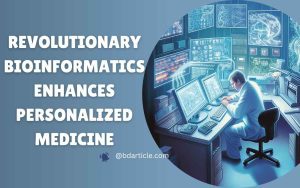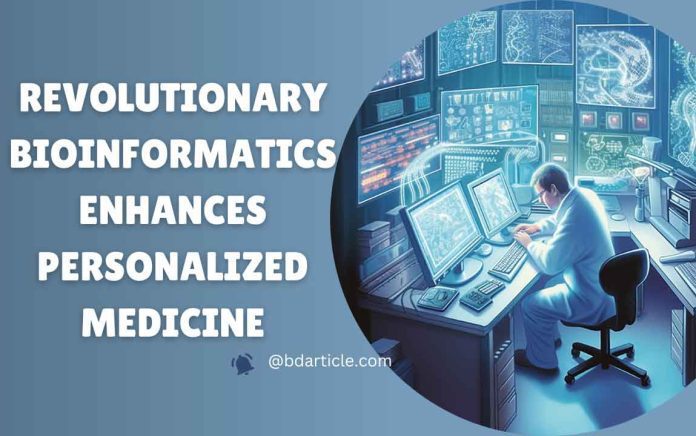Bioinformatics in personalized medicine is transforming how we approach healthcare by enabling precise, tailored treatments for individuals. By leveraging computational tools to analyze biological data, bioinformatics is unlocking the potential to identify unique genetic and molecular characteristics of patients. This transformation is not only revolutionizing how diseases are diagnosed and treated but also shaping the future of medical research and therapy development.

The Role of Bioinformatics in Personalized Medicine
At its core, bioinformatics bridges the gap between biological sciences and data analytics. It plays a critical role in personalized medicine by analyzing large datasets, such as genomic sequences, to understand disease mechanisms at an individual level. Personalized medicine moves away from the traditional “one-size-fits-all” approach to healthcare by targeting therapies that align with a patient’s unique genetic makeup.
Through bioinformatics, researchers can identify biomarkers for diseases, predict patient responses to specific drugs, and detect genetic predispositions. For instance, in cancer treatment, bioinformatics helps in understanding tumor heterogeneity and identifying targeted therapies that are more effective for specific genetic profiles.
Key Applications of Bioinformatics in Personalized Medicine
-
Genomic Sequencing and Analysis
One of the foundational tools in personalized medicine is genomic sequencing. By decoding a patient’s DNA, bioinformatics software can identify mutations and variations linked to specific diseases. This enables early diagnosis and the development of precision therapies. For instance, technologies like CRISPR benefit from bioinformatics by targeting precise genetic sequences.
-
Drug Development and Optimization
Bioinformatics plays a crucial role in pharmacogenomics—the study of how genes affect a person’s response to drugs. It enables pharmaceutical companies to develop safer and more effective drugs tailored to genetic subgroups of patients. This reduces adverse reactions and improves treatment outcomes.
-
Predictive Modeling and Disease Risk Assessment
With vast datasets, bioinformatics creates predictive models to assess the risk of developing conditions such as diabetes or cardiovascular diseases. These insights allow for preventive strategies and lifestyle modifications based on individual risk factors.
-
Integration of Multi-Omics Data
In personalized medicine, bioinformatics integrates genomics, proteomics, and metabolomics data to gain a comprehensive understanding of biological systems. This holistic approach ensures that all factors contributing to a patient’s health are considered when devising treatments.
Advancements Driving Bioinformatics in Personalized Medicine
-
Artificial Intelligence and Machine Learning
AI and machine learning algorithms have accelerated the analysis of complex biological data. These technologies enable pattern recognition in datasets, improving diagnostic accuracy and therapeutic development. Neuromorphic Engineering Advancements Revolutionizing AI also contribute to these capabilities by mimicking neural processing systems for faster and more efficient computations.
-
Cloud Computing and Big Data
With the exponential growth of biological data, cloud computing provides scalable solutions for storing and processing datasets. Bioinformatics platforms utilize big data technologies to analyze patient data in real-time, enhancing the speed of medical decisions.
-
Ethical and Regulatory Frameworks
As personalized medicine evolves, bioinformatics ensures that patient data privacy is maintained. Regulatory frameworks guide how genetic information is stored, shared, and used for clinical research.
Challenges in Implementing Bioinformatics in Personalized Medicine
Despite its transformative potential, several challenges must be addressed:
- Data Integration: Combining data from various sources and formats remains a technical hurdle.
- Cost of Genomic Sequencing: Although costs have decreased, genomic sequencing remains expensive for widespread use.
- Ethical Concerns: Issues surrounding genetic data ownership and the risk of misuse pose significant barriers.
The Future of Personalized Medicine with Bioinformatics
The integration of bioinformatics in personalized medicine heralds a new era in healthcare. Emerging technologies, such as digital twins, allow for simulations of patient conditions to test treatments virtually. In addition, advancements in wearable devices and biosensors enable continuous monitoring of patient health, providing real-time data for bioinformatics platforms to analyze.
Looking forward, bioinformatics will play a pivotal role in global health initiatives. As precision medicine becomes more accessible, it has the potential to reduce healthcare costs by minimizing trial-and-error in treatments and improving patient outcomes.
External Resources for Further Exploration
Conclusion
Bioinformatics in personalized medicine is more than just a technological advancement—it is a revolution shaping the future of healthcare. By enabling precision diagnostics, predictive modeling, and tailored therapies, it provides hope for more effective and equitable treatments worldwide. The journey ahead promises innovations that will further enhance patient care and transform medical science.
#BioinformaticsInPersonalizedMedicine #GenomicSequencing #DrugDevelopment

